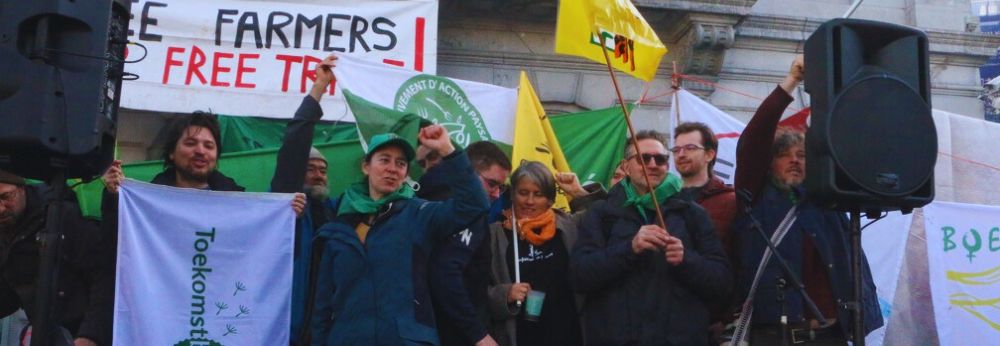Ending free trade agreements: CJEU ruling on EU-Morocco deal shows the way

European Coordination Via Campesina (ECVC) Press Release
This 16 October, International Day of Action for People’s Food Sovereignty and Against Multinational Companies, we welcome the decision of the Court of Justice of the European Union (CJEU), dated 4 October 2024, concerning the free trade agreement between the EU and Morocco[i]. This verdict once again underlines the harmful impacts of free trade for agricultural and fisheries products, particularly on the peasant economy and people living in rural areas[ii]. However, while ECVC is satisfied with the CJEU decision, current measures available to enforce it are not up to the challenge.
According to the CJEU ruling, the agreement, which entered into force in 2019, failed to secure the consent of the Sahrawi people of the Western Sahara, who filed the complaint and were represented by the Polisario Front. The Sahrawi people were judged to have never consented to sign the agreement, contrary to what the European and Moroccan signatories of the agreement had stated. This is increasingly clear as the consequences of a deregulated trade relationship with the EU become more and more evident. The region has seen an export-oriented industrial agricultural system develop, particularly in the Dakhla region where hundreds of hectares of tomato greenhouses[iii] pollute the soil, empty the water tables and exploit workers in precarious conditions, leaving local populations as a demographic minority. In this, the Moroccan state aims to secure more effective control of the territory of the Sahrawi Arab Democratic Republic. Many European firms, such as Azura[iv], are also upholding this very lucrative system, by exploiting the people and land on this territory and by importing products almost free of charge to Europe. Said products flood the European market and are sold at prices that appeal to consumers but put immense pressure on European market gardeners. This free trade agreement thus encourages land and water grabbing and the exploitation of workers in precarious conditions by European companies who then export to the EU, thus maintaining a colonial logic and creating unfair competition with small and medium-sized Moroccan market gardeners.
In accordance with the decision of the CJEU, we demand:
- The immediate suspension of this now-illegal agreement. The predatory practices it encourages cannot be allowed to continue for another 12 months
- An immediate ban to stop products from the Sahrawi Arab Democratic Republic entering into European territory
This predatory relationship with dominated territories is not specific to Western Sahara; it is symptomatic of free trade agreements, which reinforce relationships of dependency, fuel the monopolization of natural resources and undermine the prospect of food sovereignty, which is the model that rural populations desire.
This decision by the CJEU must set a precedent. It once again legitimises ECVC and La Via Campesina’s longstanding fight to remove agriculture from free trade agreements. Agricultural products are not commodities, and when they are treated as such, the consequences for rural populations and the environment are disastrous.
For this reason, ECVC rejects all free trade agreements that integrate agriculture into the rules of the global market. The current discussions on a possible free trade agreement between the EU and MERCOSUR region prove that those leading the negotiations do not understand, or worse, are choosing to ignore, the considerable damage that these trade agreements cause for Global South countries, European agriculture and the entire rural world. Opposition to these agreements was one of the major demands of the European farmer mobilisations at the start of this year and farmers will continue to take action to demand a new trade paradigm.
[i] Link to the CJEU decision: https://curia.europa.eu/jcms/upload/docs/application/pdf/2024-10/cp240170fr.pdf
[ii]. As mentioned in the UNDROP statement
[iii]. Mundubat’s study : https://www.mundubat.org/proyecto/estudio-sobre-la-produccion-de-tomate-en-la-region-de-dakhla/
[iv]. Mundubat’s study above
